The justices have not ruled on whether discrimination based on gender identity is unconstitutional.
In the past three years, however, many Republican-led states have enacted laws that forbid medical treatments intended to help youths under age 18 transition to what the measures describe as a “purported identity inconsistent with the minor’s sex.”
The Biden administration, the ACLU and Lambda Legal urged the court to hear cases from Tennessee and Kentucky and to rule discrimination against transgender youth violates the Constitution’s guarantee of equal protection of the laws.
They argued that a law “targeting transgender individuals for disfavored treatment” is a form of sex discrimination and should be struck down as unconstitutional.
The court said it would hear arguments in the fall.
In her appeal, Solicitor Gen. Elizabeth Prelogar said the state laws impose “a categorical ban on evidence-based treatments supported by the overwhelming consensus of the medical community.” The high court’s “intervention is warranted now,” she said.
The ACLU and Lambda also said the state laws should be struck down because they “violate the fundamental right of parents to make decisions concerning the medical care of their children.”
In defense of his state’s law, Tennessee’s Atty. Gen. Jonathan Skrmetti described it as a measure “to protect children from unproven medical interventions.”
He said the number of minors diagnosed with gender dysphoria has “exploded” in recent years, and states have “seen a corresponding surge in unproven and risky medical interventions for these underage patients.”
He said state lawmakers had “reasonably concluded that the well-documented risks of cross-sex hormones outweigh any purported benefits.”
But the American Academy of Pediatrics, joined by 21 other medical and mental health organizations, filed a friend-of-court brief at the Supreme Court to dispute Tennessee’s contention that the hormone treatments are experimental or ineffective.
They said about 1.4 million persons in the United States are transgender, and about about 10% of them are teenagers ages 13 to 17. They said “research shows that adolescents with gender dysphoria who receive puberty blockers or hormone therapy experience less depression, anxiety and suicidal ideation. … Banning such care can put patients’ lives at risk.”
In April, the Williams Institute at the UCLA Law School said 24 states have adopted laws restricting treatment for transgender youth, potentially affecting about 114,000 minors or more than a third of the transgender youth in the United States. But many of those state laws have been temporarily blocked by judges.
The Supreme Court ruled four years ago that discrimination against transgender employees violates the Civil Rights Act of 1964 and its bar against sex discrimination in the workplace. But the justices have not ruled on whether the Constitution or federal education laws prohibit discrimination against transgender youth or adults.
Last month, however, the justices by a 6-3 vote issued an order that set aside a judge’s decision and allowed Idaho to enforce its law prohibiting medical treatments for transgender teens.
A federal judge also had initially blocked the Tennessee law from taking effect last year. But in July, the Ohio-based 6th Circuit Court in a 2-1 decision became the first appeals court to rule such a law may go into effect.
The state’s lawmakers had questioned the safety and effectiveness of hormone treatments for teens, and they “may reasonably exercise caution in these circumstances,” wrote Chief Judge Jeffrey Sutton for the 6th Circuit Court. He said there is genuine disagreement over hormone treatments for young people and “life-tenured federal judges should be wary of removing a vexing and novel topic of medical debate from the ebbs and flows of democracy.”
